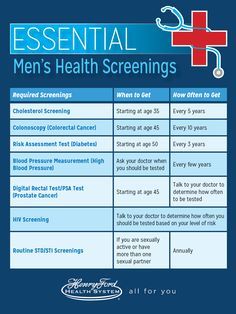Regular health screenings are crucial for maintaining optimal health and diagnosing potential problems early on. While men are often not as proactive as women when it comes to seeking medical care, prioritizing routine check-ups is essential for ensuring a long and healthy life. In this article, we will explore the various screenings that men should undergo at different stages of their lives to detect and prevent potential health issues.
Starting in Your 20s: Establishing a Baseline
As young adults, men should aim to establish a baseline for their health in their 20s. During this decade, it is important to get a comprehensive physical examination that includes:
Blood pressure measurement
Height and weight assessment
Blood tests to evaluate cholesterol levels and blood sugar
30s and 40s: Detecting Silent Killers
When men enter their 30s and 40s, certain screenings become increasingly important to detect potential silent killers.
Prostate Cancer Screening
Beginning around age 40, men should discuss prostate cancer screening with their doctor. This usually involves a blood test called the Prostate-Specific Antigen (PSA) test, which helps detect early signs of prostate cancer.
Heart Disease Screening
As men age, the risk of heart disease increases. Starting in their 40s, men should have regular screenings for heart disease risk factors, including:
Blood pressure measurement and cholesterol levels evaluation
Electrocardiogram (EKG) to assess heart rhythm and function
Stress test to evaluate heart performance during physical activity
50s and Beyond: Detecting Age-Related Conditions
Once men reach their 50s, it becomes crucial to closely monitor age-related conditions. Several screenings are recommended to catch potential problems early on:
Colorectal Cancer Screening
Beginning at age 50, men should undergo regular screenings for colorectal cancer. This usually involves a colonoscopy, which allows doctors to examine the colon for any abnormal growths or signs of cancer.
Osteoporosis Screening
Although osteoporosis is commonly associated with women, men are still at risk. Around age 65, men should consider getting a dual-energy X-ray absorptiometry (DEXA) scan to measure bone density and assess the risk of osteoporosis.
Testosterone Screening
Starting around age 50, men should discuss testosterone screening with their doctor. Low testosterone levels can lead to various health issues, including fatigue, decreased sex drive, and muscle weakness.
Conclusion
Regular health screenings are essential for all men, regardless of their age. By undergoing the appropriate screenings at various stages of life, potential health issues can be detected early on, maximizing the chances of successful treatment and prevention. Don’t wait until symptoms arise; prioritize your health and schedule a check-up with your healthcare provider today!

